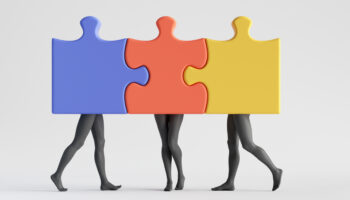February 28 is Metamour Day! Founded by the National Coalition for Sexual Freedom (NCSF), the day is meant to foster positive relationships between you and your metamours (or, in non-monogamy speak, your partner’s partner, with whom you have no romantic connection) and acknowledge the unique role a meta is in your partners’ lives and tangentially (or directly) your own life.
I’ve had many metamours over the years. Some have been delightful and made my life better; others I’ve been straight-up indifferent about. I’ve had threesomes with metamours, planned events for our mutual partner(s), and forged friendships that have outlasted my relationships.
Most of the time, I prefer to practice kitchen table polyamory, a situation where everyone in the polycule comes together in a tribe-like structure and is comfortable sitting together at the kitchen table over a cup of coffee. I prefer to engage in relationships that are long-term and emotionally invested with lots of room to grow. My metas play a role in that mix.
I’m also open to parallel polyamory scenarios, where it’s more of a you-do-your-thing, I'll-do-mine and, yes, we share a partner, but our lives don’t intersect. Sure, our separate relationships progress, but we’re not friends, we may never meet, and we have no part in each other’s lives. This dynamic seems more deliberate and more about awareness, acceptance, and autonomy.
There’s also the don’t ask don’t tell (DADT) dynamic. Historically, it hasn’t worked for me. I don’t have to have contact with my metamours, but I don’t like being kept secret or marginalized.
As a poly practitioner, we hear a lot about when problems arise in these relationship dynamics. I get it. The concept of polyamory is relatively new to a lot of people, and it's not like we have a definitive road map on how to navigate alternative relationship models. If you think about it, most representation we see in movies and the media of when two people fall in love with the same person isn’t exactly the behavior we'd want to mimic. Think "Bridget Jones’ Diary," the British romantic comedy where the nice guy and the hotshot face off over the hopelessly frazzled heroine.
That said, there are plenty of success stories where multiple romances work out, and it’s nice to have a day to appreciate it. Here’s a breakdown of the primary takeaways I’ve learned on what you ideally should and shouldn’t do to be a decent metamour.
Read: A Polyamory Toll Kit: 5 Tips for Managing Your Relationships
Respect Boundaries
Obviously, there will be metas who don’t want to meet. No one is entitled to or under any obligation to meet another person. Period. I'm intentional about how I spend my time and who I spend it with. If I don't feel an enthusiastic "fuck yes" that my metamour is someone I’d befriend on my own, I generally don't. It's nothing personal; I have minimal free time and meeting a meta shouldn't be the price I have to pay to date someone. And if someone doesn’t want to meet me, NBD. Nobody likes forced compersion. We need to abandon the idea that there is a “right” way to do polyamory.
“Fear of the unknown” Is a Real Thing
If you don’t know your metamour, it's easy to imagine them as some perfect babe who's good at everything and literally has no weaknesses. Once you get to know someone, it's OK to be still intimidated, but at least they're a real person and potential ally and friend – flaws and all. Trust me, it’s much easier to identify with someone once you’ve met them and gained this perspective. If you still find yourself feeling less than your metamour, remember: your partner is dating the both of you, which means you're both in the same league.
Read: When Your Partner Sleeps With Someone Else - and It Makes You Happy
Trust Is Everything
I find that when I meet a metamour, most of my insecurities and jealousy melt away. We don’t have to be BFFs (although I’ve been very close with some of my metas). But if I can meet and greet and get along with my metamour, it establishes a certain level of trust between the two of us that makes it much easier to move forward with confidence.
Ditto for Empathy
I've also found that I'm a better metamour when I try to put myself in their shoes and think about them from a place of compassion. There’s a lot of uncertainty in relationships, and especially in non-monogamous dynamics. For example, it’s one thing to say you’re OK with your partner going out on a date with someone else. The feelings that may surface when they’re actually out on a date may tell a different story. It’s easy to get caught up in your head and create stories. If I take a step back and try to find common ground with my metas, it helps settle any uncomfortable feelings.
Flexibility Will Make Things Go Smoother
Managing multiple relationships isn’t for the faint of heart. Flexibility is key. Some of my worst metamours were the ones who got upset when things didn’t go exactly as planned. The thing is, life doesn’t always go as planned, and when you bring multiple people and competing commitments into the mix, the probability of that happening compounds. Nobody wants to cancel plans (people who continuously flake on plans are a big red flag in my book), but sometimes it happens and throwing a hissy fit doesn’t help build metamour bonds. Be respectful of your partner’s and meta’s time.
Communication Is Key
For any relationship to succeed, it requires clear and open communication. When you’re poly and dating, it requires some next-level communication skills, because you need to make sure the needs of multiple people are being met. I try to keep a “we’re all in this together” mentality, which means being mindful of my meta’s needs. Even if I'm not in direct contact with my meta, there’s communication with my partner about the various dynamics and their necessary needs when they arise.
I'd like to believe that all of us would want to become better metas and to build better relationships with our metas. Even if we’re not in direct, regular contact, it sure is nice to share the joy of our shared partners and relationships. Happy Metamour Day!




